人教版九年级全册Unit1 How can we become good learners?课件(共68张PPT,内嵌音频)
文档属性
| 名称 | 人教版九年级全册Unit1 How can we become good learners?课件(共68张PPT,内嵌音频) |  | |
| 格式 | pptx | ||
| 文件大小 | 17.2MB | ||
| 资源类型 | 教案 | ||
| 版本资源 | 人教新目标(Go for it)版 | ||
| 科目 | 英语 | ||
| 更新时间 | 2023-07-26 22:40:20 | ||
图片预览

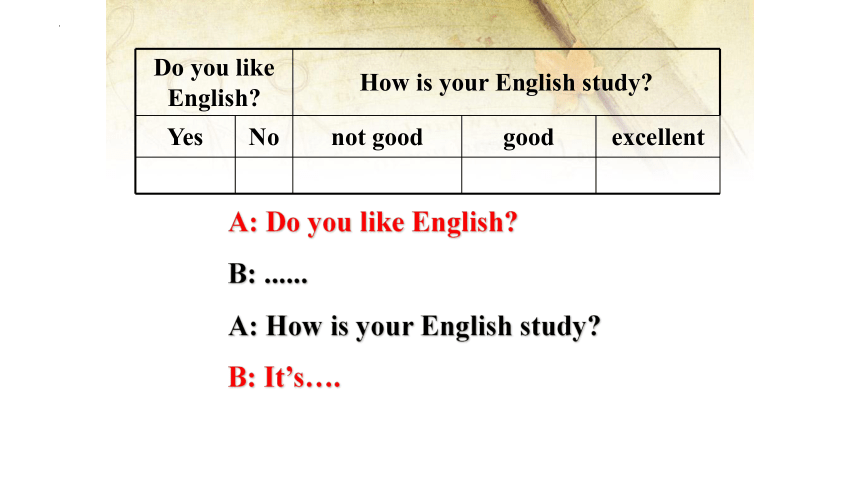
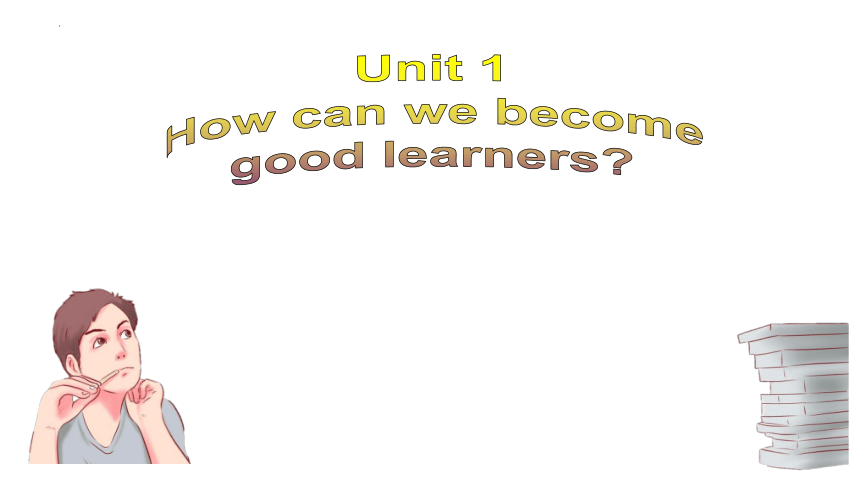
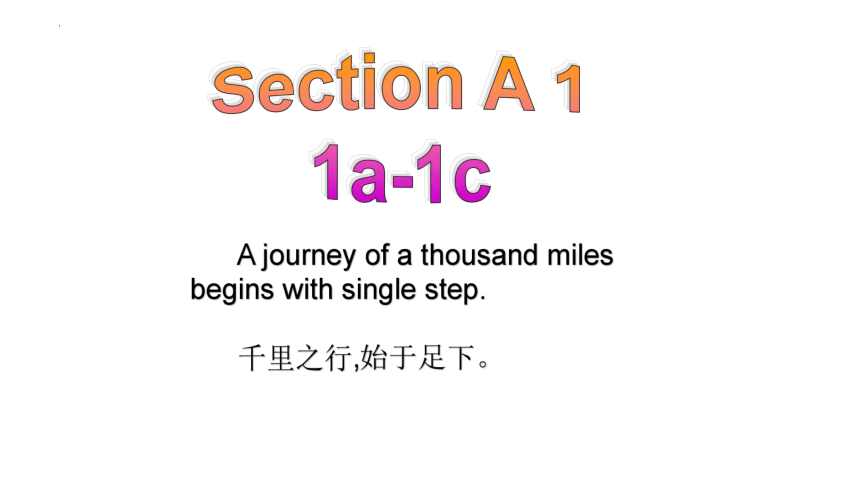
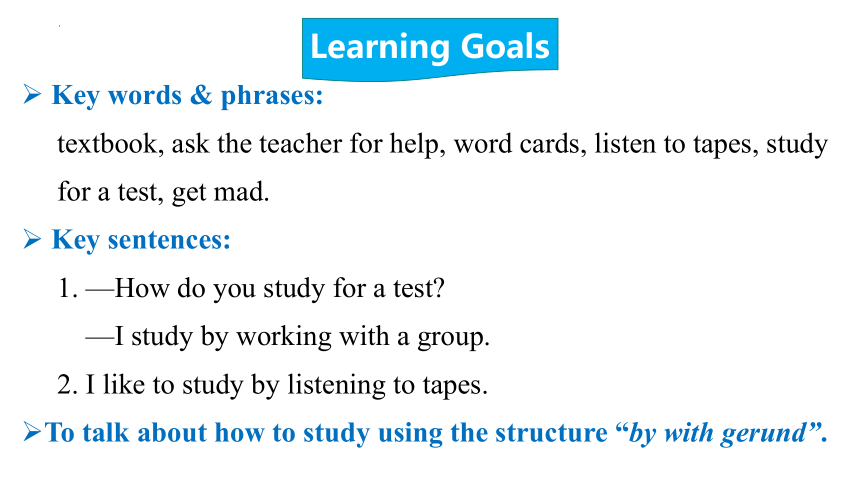



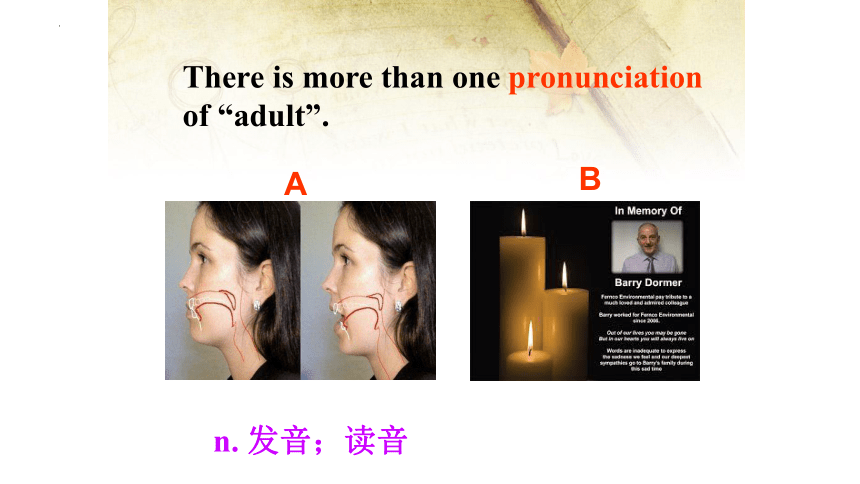
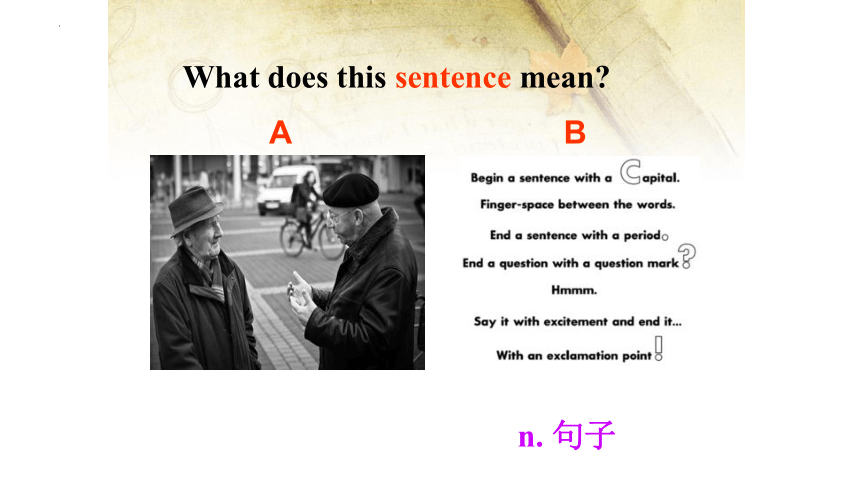


文档简介
(共68张PPT)
Where can you see or hear English
Do you like English How is your English study Yes No not good good excellent
A: Do you like English
B: ......
A: How is your English study
B: It’s….
Unit 1
How can we become
good learners
Section A 1
1a-1c
A journey of a thousand miles begins with single step.
千里之行,始于足下。
Learning Goals
Key words & phrases:
textbook, ask the teacher for help, word cards, listen to tapes, study
for a test, get mad.
Key sentences:
1. —How do you study for a test
—I study by working with a group.
2. I like to study by listening to tapes.
To talk about how to study using the structure “by with gerund”.
Word Study
She is reading a textbook.
n. 课本
Please choose the right meaning.
A
B
I had a long conversation with her the other day.
n. 交谈;谈话
A
B
He read the letter aloud to us.
adv. 大声地;出声地
A
B
There is more than one pronunciation of “adult”.
n. 发音;读音
A
B
What does this sentence mean
n. 句子
A
B
She is very patient with young children.
adj. 有耐心的
A
B
by working with friends.
How do you study English
by making word cards.
by asking the teacher for help.
by listening to tapes.
by reading the textbook.
by working with a group.
n. 课本
Presentation
1a
Check (√) the ways you study English. Then add other ways you sometimes study.
_____a. by working with friends ____ e. by asking the teacher for help
_____b. by making word cards ______________________________
_____ c. by reading the textbook ______________________________
_____ d. by listening to tapes _____________________________
by taking notes
by making a foreign pen pal
by doing exercises
√
√
√
Pair work
Do you have any other ways to learn English
Let’s make conversations with partners.
I study English by watching English movies.
I study English by reading English stories.
Let’s practice
---How do you study English
---I study English
/ By ......
by working with friends.
by making word cards.
by reading the textbook.
by listening to tapes
by asking the teacher for help.
Listen. How do these students study for a test Write letters from 1a above.
___ 1. Meiping
___ 2. Peter
___ 3. Tony
Listening
1b
b
e
d
Boy: Hey, everybody. There’s a big test on Tuesday. I really need some help. Can you
tell me how you study for a big test
Voices: Sure! Yes. Sure we will.
Boy: You did really well on the last English test, didn’t you, Meiping
Meiping: Yeah, I did OK.
Boy: Well, how did you study for it
Meiping: By making word cards.
Boy: Maybe I’ll try that. So, how do you study for a test, Peter
Peter: By asking the teacher for help. She’s always happy to answer my questions.
Boy: That’s interesting. How do you study, Tony
Tony: I like to study by listening to tapes. But sometimes my mother thinks I’m
listening to music. And then she gets mad.
Boy: Oh, maybe I won’t do that then.
Tapescript
A: How do you study for a test
B: I study by working with a group.
Name How …
……
……
Report: …. studies for a test by …(换人称)
Language Points
—How do you study for a test
你是怎样准备考试的
—I study by working with a group.
我通过和小组成员合作学习。
【句型剖析】
how引导特殊疑问句,常用来提问by引导的方式状语。
Language Points
listening
watching
A
◆by的用法:
(1) by doing sth “通过……方式” by studying with a group
【注】介词短语作方式状语,回答以How开头的问句, 表示“怎样做”。
①I study English by ___________(listen) to the tapes.
②Tom learns Chinese by __________(watch) Chinese movies.
③ — ____ did you get there
— By ___ a taxi.
A. How; taking B. How; take C. How; took D. What; taking
Summary目标升华
By+V-ing
How do you……? By……
Exercises
一、按要求完成句子。
1. I study English by working with his friends.
_______ ___ ______ study English
2. He studies English by listening to English.
______ ____ ______ study English
3. 你可以通过阅读报纸学习英语。
You can study English _____ _________ newspapers.
How do you
How does he
by reading
Homework强化补清
Preview the conversation in 2d.
Do the exercises in students’ book.
Thank you!Free powerpoint template: www.Words & Expressions
Let's read
conversation
aloud
pronunciation
sentence
patient
n. 交谈;谈话
adv. 大声地;出声地
n. 发音;读音
n. 句子
adj. 有耐心的 n. 病人
four skills
How can we
learn English
listening skills
speaking skills
reading skills
writing skills
How do you improve your
listening skills
by listening to tapes
by listening to English songs
by watching English movies
How do you improve your
speaking skills
by practicing speaking
by having conversations with friends in English
by joining English clubs
How do you improve your
reading skills
by
by having conversations with friends in English
by joining English clubs
How do you improve your
writing skills
by writing to your pen pal
by keeping a diary
Listen and check(√) the questions you hear.
√
√
√
√
2a
Listen again. Match each answer below with a question above.
2b
b
c
d
a
Man: Welcome to the English club. Today we’re going to talk about the best ways
to learn English. Does anyone learn English by watching videos
Girl 1: No. It’s too hard to understand spoken English.
Boy 1: What about keeping a diary in English Do you learn English that way
Girl 1: Yes, I do. It helps to write English every day.
Boy 2: Have you ever studied with a group
Girl 2: Yes, I have! I’ve learned a lot that way.
Boy 2 : Do you have conversations with friends in English
Girl 2: Oh, yes. It really improves my speaking skills.
Girl 1: What about reading aloud to practice pronunciation
Boy 1 : I do that sometimes. I think it helps.
Girl 2 : I do, too. And I often look up new words in a dictionary.
Boy 2 : That’s a great idea!
Tapescript
2c
Make conversations using the information in 2a and 2b.
Have you ever studied with a group
Yes, I have. I’ve learned a lot that way.
2c
Role-play the conversation.
1. What are the names of the girl and boy in the conversation
2. Why is Jack nervous
2d
3. What’s Jack’s problem
4. What’s Annie’s advice for Jack’s problem
Jack: Annie, I’m a little nervous. I have to finish reading a book and give a
report next Monday.
Annie: That doesn't sound too bad.
Jack: But I'm a very slow reader.
Annie: Just read quickly to get the main ideas at first.
Don't read word by word. Read word groups.
Jack: But I don’t understand many of the words. I have to use a dictionary.
Annie: Try to guess a word’s meaning by reading the sentences before and
after it. You probably understand more than you think.
Jack: That sounds difficult!
Annie: Well, be patient. It takes time. You can become better by reading
something you enjoy every day. The more you read, the faster you'll be.
Role-play the conversation.
1. What are the names of the girl and boy in the conversation
2. Why is Jack nervous
2d
They are Annie and Jack.
Because he has to finish reading a book and give a report next Monday.
Problems
1. a little nervous
2. read very slowly
3. Don't understand many of the words.
Solutions
1. read quickly to get the main idea
2. Don't read word by word. Read word groups.
3. guess a word’s meaning by reading the meaning before and after it
4. Be paitent. It takes time.
5.The more you read, the faster you'll be.
Role-play
1. Role play the conversation in pairs;
2. Role play the conversation in front of the class
2d
2d
Fill in the blanks according to the conversation.
Jack has to finish reading a book and give a report next Monday. He's ____________ because he is ________________. Annie suggests that he should just read quickly to get the main ideas _____. Don't read ______________. Read ______________. Jack can't understand many of the words. He has to ______________. Annie advises Jack to try to guess a word's meaning ______________________ before and after it. All in all, _________ you read, _________ you'll be.
a little nervous
a very slow reader
at first
word by word
word groups
use a dictionary
by reading the sentences
the more
the more
Language Points
1. Do you have conversations with friends in English (教材P2)
conversation n. 交谈;谈话
常用搭配:
(1) have conversations/a ( long/short)conversation with sb. about sth. 就某事与某人交谈( 长谈/ 作简短的交谈)
e.g. I had a long conversation with her the other day.
前几天我和她谈了很久。
(2) make(up) a conversation = make a dialog 编对话
e.g. Let’s make (up) a conversation about asking directions.
我们编一个问路的对话吧。
(3) to start a conversation 开始对话,主动攀谈
e.g. She was too shy to start a conversation with anyone there.
她太害羞了以至于没有和那儿的任何人主动交谈。
(4) be in conversation with sb. 在与某人谈话(指谈话正在进行中)
e.g. Dick was deep in conversation with the girl on his right.
迪克正在与他右边的女孩专心交谈。
2. What about reading aloud to practice pronunciation (教材P2)
What about... “……怎么样?”,相当于How about... 其后接名词或动名词。表示征求对方意见或者向对方提出建议。
e.g. What about/How about going out for a walk
出去散步怎么样?
英语中常见的表达建议的句型还有:
Why don’t you do sth. =Why not do sth.
你为什么不做某事呢?
Let’s do sth.咱们做某事吧。
You’d better (not) do sth.你最好(不要)做某事。
You should (not) do sth.你应该(不)做某事。
aloud adv. 大声地; 出声地
辨析:aloud,loudly与loud
aloud adv. 大声地;出声地,常与call, shout, cry, read 等连用。 Please read the passage aloud. 请大声读短文。
loudly adv. 喧闹地、大声地,常与knock, ring 连用。loudly 往往含有令人讨厌或打扰别人的意思,可位于动词之前或之后。 Suddenly the bell on the
wall rang loudly. 墙上的
铃突然大声地响了起来。
loud ①用作副词,几乎总是用于 loud enough, as loud as 等短语中或与too, very, so 连用。 Don’t play the tape so loud.
播放磁带声音别那么大。
②可作形容词,用于固定搭配:in a loud voice 大声地 Our teacher always
speaks in a loud voice. 我
们老师总是说话声音很大。
pronunciation n. 发音;读音
e.g. The word has two pronunciations. 这个单词有两个发音。
My brother is practicing his pronunciation.
我的弟弟正在练习发音。
The pronunciation of the word is really strange.
这个单词的发音真奇怪。
Who can tell me how to pronounce the word
谁能告诉我这个单词怎么发音?
可数名词, 表示单词发音个数
不可数名词, 表示发音方法或能力
……的发音
pronunciation 的动词形式。
Language Points
I have to finish reading a book and give a report next Monday. 我必须去读完一本书然后在下周一做一个报告。
have to 不得不;必须(客观)
e.g. I have to do my homework.
我必须去做我的家庭作业。
give a report 做报告
2. Just read quickly to get the main ideas at first.
首先,仅仅通过快速阅读去获取大意。
main idea 主旨;大意
at first 首先
3. Don’t read word by word. Read word groups.
不要一个词一个词地读,而是读意群。
word by word 一个词一个词地
word groups 意群
3. Don’t read word by word.(教材P2)
word by word 逐字/ 词地,在句中作状语。介词by 表示连续或反复,意为“一个接着一个”。
类似的短语有:
one by one一个接一个地 year by year一年接一年地
step by step 一步一步地 little by little一点一点地
bit by bit 一点一点地 side by side 肩并肩地
4. Well, be patient.(教材P2)
patient adj. 有耐心的 n. 病人
patient 的词形变换:
① patience n . 耐心→in patience 耐心地
② patiently adv . 有耐心地
patient 常用的短语有:
(1)be patient with sb. /sth. 对某人/ 某事有耐心;
(2)be patient to do sth. 有耐心做某事。
【运用】
Ⅰ. 选出下列句子中patient的含义。
A. 病人 B. 有耐心的
( ) 1) Just be patient. I think you’re next.
( ) 2) He is a patient now. We should take
good care of him.
Ⅱ. 将下面的句子翻译成英语。
我们英语老师对每个学生都有耐心。
__________________________________
__________________________________
A
B
Our English teacher is patient with
every student.
5.The more you read, the faster you’ll be.(教材P2)
the +比较级(+ 主语+ 谓语),the +比较级(+ 主语+ 谓语)(主语)越……,(主语就)越……
e.g. The more you eat, the heavier you will be.
你吃得越多,你就会越胖。
The more careful you are, the fewer mistakes you will make. 你越仔细,犯的错误就越少。
6. The more you read, the faster you’ll be.
“the+比较级+ ..., the +比较级+ ...”表示
“越……,就越……”。
e.g. The warmer the weather is, the better I
will feel.
【运用】根据汉语意思完成英语句子。
你练习得越多,就写得越好。
_________ you practice, ________ you’ll write.
The more the better
Summary目标升华
What/ How about+ V-ing…
Have you + V. (P.P.)…
Yes, I have.
No, I haven’t.
根据汉语提示用正确形式填空。
1. Do you often have any _________ (课本)
2. I learn English by reciting ________
(句子).
3. Please read _____ (大声地), I can’t
hear you.
4. Your ____________ (发音) sounds
good.
5. Do you have ____________ (对话) with him in English?
textbooks
sentences
aloud
pronunciation
conversations
Practice当堂诊学
Exercises
一、根据汉语提示完成句子。
1. Did you have a ____________(交谈)with him
2. Please read_______(大声地)so that I can hear you.
3. Would you help me correct my (发音)?
4. Please repeat the following (句子)after me.
5. A kind man is not always (有耐心的).
conversation
aloud
pronunciation
sentences
patient
二、用所给单词的正确形式填空。
1. Susan studies Chinese by_______(read) in the morning.
2. How about_______(join) an English club to improve your spoken English
3. His mother made him practice__________(speak)English every day.
reading
joining
speaking
三、单项选择。
1. She improves her spoken English _______ practicing conversations.
A. in B. on C. by D. at
2. — Mum, my little sister is crying all the time.
— Mary, be ______! She feels sick. You should take good care of
her.
A. patient B. lazy C. polite D. fair
3. — ___________ listening to English tapes
— That sounds great. I think it’s a good way to improve your
listening skills.
A. Would you like B. Why not
C. Could you please D. What about
A
C
D
4. Remember this, John. ______ careful you are, ______ mistakes you
will make.
A. The more; the less B. The more; the fewer
C. The less; the fewer D. The more; the more
5. — Julie, your mobile is ringing.
— Wait a minute. It’s dangerous _______ it while crossing the
street.
A. answer B. to answer C. answering D. answered
B
B
1. -- 你是怎样准备考试的?
-- 哦,我通过小组学习。
--How do you study for a test
--Well, I study by working with a group.
2.-- 你曾经参加过学习小组吗?
-- 是的,参加过。通过这种方式我学会
许多。
-- Have you ever studied with a group
-- Yes, I have. I’ve learned a lot that way.
汉译英。
Make a survey about learning English in groups, and then interview others about their experiences of learning English. Write down your report.
2. Preview the new words and expressions.
3. Preview the article on page 3.
Homework
Thank you for listening
Where can you see or hear English
Do you like English How is your English study Yes No not good good excellent
A: Do you like English
B: ......
A: How is your English study
B: It’s….
Unit 1
How can we become
good learners
Section A 1
1a-1c
A journey of a thousand miles begins with single step.
千里之行,始于足下。
Learning Goals
Key words & phrases:
textbook, ask the teacher for help, word cards, listen to tapes, study
for a test, get mad.
Key sentences:
1. —How do you study for a test
—I study by working with a group.
2. I like to study by listening to tapes.
To talk about how to study using the structure “by with gerund”.
Word Study
She is reading a textbook.
n. 课本
Please choose the right meaning.
A
B
I had a long conversation with her the other day.
n. 交谈;谈话
A
B
He read the letter aloud to us.
adv. 大声地;出声地
A
B
There is more than one pronunciation of “adult”.
n. 发音;读音
A
B
What does this sentence mean
n. 句子
A
B
She is very patient with young children.
adj. 有耐心的
A
B
by working with friends.
How do you study English
by making word cards.
by asking the teacher for help.
by listening to tapes.
by reading the textbook.
by working with a group.
n. 课本
Presentation
1a
Check (√) the ways you study English. Then add other ways you sometimes study.
_____a. by working with friends ____ e. by asking the teacher for help
_____b. by making word cards ______________________________
_____ c. by reading the textbook ______________________________
_____ d. by listening to tapes _____________________________
by taking notes
by making a foreign pen pal
by doing exercises
√
√
√
Pair work
Do you have any other ways to learn English
Let’s make conversations with partners.
I study English by watching English movies.
I study English by reading English stories.
Let’s practice
---How do you study English
---I study English
/ By ......
by working with friends.
by making word cards.
by reading the textbook.
by listening to tapes
by asking the teacher for help.
Listen. How do these students study for a test Write letters from 1a above.
___ 1. Meiping
___ 2. Peter
___ 3. Tony
Listening
1b
b
e
d
Boy: Hey, everybody. There’s a big test on Tuesday. I really need some help. Can you
tell me how you study for a big test
Voices: Sure! Yes. Sure we will.
Boy: You did really well on the last English test, didn’t you, Meiping
Meiping: Yeah, I did OK.
Boy: Well, how did you study for it
Meiping: By making word cards.
Boy: Maybe I’ll try that. So, how do you study for a test, Peter
Peter: By asking the teacher for help. She’s always happy to answer my questions.
Boy: That’s interesting. How do you study, Tony
Tony: I like to study by listening to tapes. But sometimes my mother thinks I’m
listening to music. And then she gets mad.
Boy: Oh, maybe I won’t do that then.
Tapescript
A: How do you study for a test
B: I study by working with a group.
Name How …
……
……
Report: …. studies for a test by …(换人称)
Language Points
—How do you study for a test
你是怎样准备考试的
—I study by working with a group.
我通过和小组成员合作学习。
【句型剖析】
how引导特殊疑问句,常用来提问by引导的方式状语。
Language Points
listening
watching
A
◆by的用法:
(1) by doing sth “通过……方式” by studying with a group
【注】介词短语作方式状语,回答以How开头的问句, 表示“怎样做”。
①I study English by ___________(listen) to the tapes.
②Tom learns Chinese by __________(watch) Chinese movies.
③ — ____ did you get there
— By ___ a taxi.
A. How; taking B. How; take C. How; took D. What; taking
Summary目标升华
By+V-ing
How do you……? By……
Exercises
一、按要求完成句子。
1. I study English by working with his friends.
_______ ___ ______ study English
2. He studies English by listening to English.
______ ____ ______ study English
3. 你可以通过阅读报纸学习英语。
You can study English _____ _________ newspapers.
How do you
How does he
by reading
Homework强化补清
Preview the conversation in 2d.
Do the exercises in students’ book.
Thank you!Free powerpoint template: www.Words & Expressions
Let's read
conversation
aloud
pronunciation
sentence
patient
n. 交谈;谈话
adv. 大声地;出声地
n. 发音;读音
n. 句子
adj. 有耐心的 n. 病人
four skills
How can we
learn English
listening skills
speaking skills
reading skills
writing skills
How do you improve your
listening skills
by listening to tapes
by listening to English songs
by watching English movies
How do you improve your
speaking skills
by practicing speaking
by having conversations with friends in English
by joining English clubs
How do you improve your
reading skills
by
by having conversations with friends in English
by joining English clubs
How do you improve your
writing skills
by writing to your pen pal
by keeping a diary
Listen and check(√) the questions you hear.
√
√
√
√
2a
Listen again. Match each answer below with a question above.
2b
b
c
d
a
Man: Welcome to the English club. Today we’re going to talk about the best ways
to learn English. Does anyone learn English by watching videos
Girl 1: No. It’s too hard to understand spoken English.
Boy 1: What about keeping a diary in English Do you learn English that way
Girl 1: Yes, I do. It helps to write English every day.
Boy 2: Have you ever studied with a group
Girl 2: Yes, I have! I’ve learned a lot that way.
Boy 2 : Do you have conversations with friends in English
Girl 2: Oh, yes. It really improves my speaking skills.
Girl 1: What about reading aloud to practice pronunciation
Boy 1 : I do that sometimes. I think it helps.
Girl 2 : I do, too. And I often look up new words in a dictionary.
Boy 2 : That’s a great idea!
Tapescript
2c
Make conversations using the information in 2a and 2b.
Have you ever studied with a group
Yes, I have. I’ve learned a lot that way.
2c
Role-play the conversation.
1. What are the names of the girl and boy in the conversation
2. Why is Jack nervous
2d
3. What’s Jack’s problem
4. What’s Annie’s advice for Jack’s problem
Jack: Annie, I’m a little nervous. I have to finish reading a book and give a
report next Monday.
Annie: That doesn't sound too bad.
Jack: But I'm a very slow reader.
Annie: Just read quickly to get the main ideas at first.
Don't read word by word. Read word groups.
Jack: But I don’t understand many of the words. I have to use a dictionary.
Annie: Try to guess a word’s meaning by reading the sentences before and
after it. You probably understand more than you think.
Jack: That sounds difficult!
Annie: Well, be patient. It takes time. You can become better by reading
something you enjoy every day. The more you read, the faster you'll be.
Role-play the conversation.
1. What are the names of the girl and boy in the conversation
2. Why is Jack nervous
2d
They are Annie and Jack.
Because he has to finish reading a book and give a report next Monday.
Problems
1. a little nervous
2. read very slowly
3. Don't understand many of the words.
Solutions
1. read quickly to get the main idea
2. Don't read word by word. Read word groups.
3. guess a word’s meaning by reading the meaning before and after it
4. Be paitent. It takes time.
5.The more you read, the faster you'll be.
Role-play
1. Role play the conversation in pairs;
2. Role play the conversation in front of the class
2d
2d
Fill in the blanks according to the conversation.
Jack has to finish reading a book and give a report next Monday. He's ____________ because he is ________________. Annie suggests that he should just read quickly to get the main ideas _____. Don't read ______________. Read ______________. Jack can't understand many of the words. He has to ______________. Annie advises Jack to try to guess a word's meaning ______________________ before and after it. All in all, _________ you read, _________ you'll be.
a little nervous
a very slow reader
at first
word by word
word groups
use a dictionary
by reading the sentences
the more
the more
Language Points
1. Do you have conversations with friends in English (教材P2)
conversation n. 交谈;谈话
常用搭配:
(1) have conversations/a ( long/short)conversation with sb. about sth. 就某事与某人交谈( 长谈/ 作简短的交谈)
e.g. I had a long conversation with her the other day.
前几天我和她谈了很久。
(2) make(up) a conversation = make a dialog 编对话
e.g. Let’s make (up) a conversation about asking directions.
我们编一个问路的对话吧。
(3) to start a conversation 开始对话,主动攀谈
e.g. She was too shy to start a conversation with anyone there.
她太害羞了以至于没有和那儿的任何人主动交谈。
(4) be in conversation with sb. 在与某人谈话(指谈话正在进行中)
e.g. Dick was deep in conversation with the girl on his right.
迪克正在与他右边的女孩专心交谈。
2. What about reading aloud to practice pronunciation (教材P2)
What about... “……怎么样?”,相当于How about... 其后接名词或动名词。表示征求对方意见或者向对方提出建议。
e.g. What about/How about going out for a walk
出去散步怎么样?
英语中常见的表达建议的句型还有:
Why don’t you do sth. =Why not do sth.
你为什么不做某事呢?
Let’s do sth.咱们做某事吧。
You’d better (not) do sth.你最好(不要)做某事。
You should (not) do sth.你应该(不)做某事。
aloud adv. 大声地; 出声地
辨析:aloud,loudly与loud
aloud adv. 大声地;出声地,常与call, shout, cry, read 等连用。 Please read the passage aloud. 请大声读短文。
loudly adv. 喧闹地、大声地,常与knock, ring 连用。loudly 往往含有令人讨厌或打扰别人的意思,可位于动词之前或之后。 Suddenly the bell on the
wall rang loudly. 墙上的
铃突然大声地响了起来。
loud ①用作副词,几乎总是用于 loud enough, as loud as 等短语中或与too, very, so 连用。 Don’t play the tape so loud.
播放磁带声音别那么大。
②可作形容词,用于固定搭配:in a loud voice 大声地 Our teacher always
speaks in a loud voice. 我
们老师总是说话声音很大。
pronunciation n. 发音;读音
e.g. The word has two pronunciations. 这个单词有两个发音。
My brother is practicing his pronunciation.
我的弟弟正在练习发音。
The pronunciation of the word is really strange.
这个单词的发音真奇怪。
Who can tell me how to pronounce the word
谁能告诉我这个单词怎么发音?
可数名词, 表示单词发音个数
不可数名词, 表示发音方法或能力
……的发音
pronunciation 的动词形式。
Language Points
I have to finish reading a book and give a report next Monday. 我必须去读完一本书然后在下周一做一个报告。
have to 不得不;必须(客观)
e.g. I have to do my homework.
我必须去做我的家庭作业。
give a report 做报告
2. Just read quickly to get the main ideas at first.
首先,仅仅通过快速阅读去获取大意。
main idea 主旨;大意
at first 首先
3. Don’t read word by word. Read word groups.
不要一个词一个词地读,而是读意群。
word by word 一个词一个词地
word groups 意群
3. Don’t read word by word.(教材P2)
word by word 逐字/ 词地,在句中作状语。介词by 表示连续或反复,意为“一个接着一个”。
类似的短语有:
one by one一个接一个地 year by year一年接一年地
step by step 一步一步地 little by little一点一点地
bit by bit 一点一点地 side by side 肩并肩地
4. Well, be patient.(教材P2)
patient adj. 有耐心的 n. 病人
patient 的词形变换:
① patience n . 耐心→in patience 耐心地
② patiently adv . 有耐心地
patient 常用的短语有:
(1)be patient with sb. /sth. 对某人/ 某事有耐心;
(2)be patient to do sth. 有耐心做某事。
【运用】
Ⅰ. 选出下列句子中patient的含义。
A. 病人 B. 有耐心的
( ) 1) Just be patient. I think you’re next.
( ) 2) He is a patient now. We should take
good care of him.
Ⅱ. 将下面的句子翻译成英语。
我们英语老师对每个学生都有耐心。
__________________________________
__________________________________
A
B
Our English teacher is patient with
every student.
5.The more you read, the faster you’ll be.(教材P2)
the +比较级(+ 主语+ 谓语),the +比较级(+ 主语+ 谓语)(主语)越……,(主语就)越……
e.g. The more you eat, the heavier you will be.
你吃得越多,你就会越胖。
The more careful you are, the fewer mistakes you will make. 你越仔细,犯的错误就越少。
6. The more you read, the faster you’ll be.
“the+比较级+ ..., the +比较级+ ...”表示
“越……,就越……”。
e.g. The warmer the weather is, the better I
will feel.
【运用】根据汉语意思完成英语句子。
你练习得越多,就写得越好。
_________ you practice, ________ you’ll write.
The more the better
Summary目标升华
What/ How about+ V-ing…
Have you + V. (P.P.)…
Yes, I have.
No, I haven’t.
根据汉语提示用正确形式填空。
1. Do you often have any _________ (课本)
2. I learn English by reciting ________
(句子).
3. Please read _____ (大声地), I can’t
hear you.
4. Your ____________ (发音) sounds
good.
5. Do you have ____________ (对话) with him in English?
textbooks
sentences
aloud
pronunciation
conversations
Practice当堂诊学
Exercises
一、根据汉语提示完成句子。
1. Did you have a ____________(交谈)with him
2. Please read_______(大声地)so that I can hear you.
3. Would you help me correct my (发音)?
4. Please repeat the following (句子)after me.
5. A kind man is not always (有耐心的).
conversation
aloud
pronunciation
sentences
patient
二、用所给单词的正确形式填空。
1. Susan studies Chinese by_______(read) in the morning.
2. How about_______(join) an English club to improve your spoken English
3. His mother made him practice__________(speak)English every day.
reading
joining
speaking
三、单项选择。
1. She improves her spoken English _______ practicing conversations.
A. in B. on C. by D. at
2. — Mum, my little sister is crying all the time.
— Mary, be ______! She feels sick. You should take good care of
her.
A. patient B. lazy C. polite D. fair
3. — ___________ listening to English tapes
— That sounds great. I think it’s a good way to improve your
listening skills.
A. Would you like B. Why not
C. Could you please D. What about
A
C
D
4. Remember this, John. ______ careful you are, ______ mistakes you
will make.
A. The more; the less B. The more; the fewer
C. The less; the fewer D. The more; the more
5. — Julie, your mobile is ringing.
— Wait a minute. It’s dangerous _______ it while crossing the
street.
A. answer B. to answer C. answering D. answered
B
B
1. -- 你是怎样准备考试的?
-- 哦,我通过小组学习。
--How do you study for a test
--Well, I study by working with a group.
2.-- 你曾经参加过学习小组吗?
-- 是的,参加过。通过这种方式我学会
许多。
-- Have you ever studied with a group
-- Yes, I have. I’ve learned a lot that way.
汉译英。
Make a survey about learning English in groups, and then interview others about their experiences of learning English. Write down your report.
2. Preview the new words and expressions.
3. Preview the article on page 3.
Homework
Thank you for listening
同课章节目录
- Unit 1 How can we become good learners.
- Section A
- Section B
- Unit 2 I think that mooncakes are delicious!
- Section A
- Section B
- Unit 3 Could you please tell me where the restroom
- Section A
- Section B
- Unit 4 I used to be afraid of the dark.
- Section A
- Section B
- Unit 5 What are the shirts made of?
- Section A
- Section B
- Review of Units 1-5
- Unit 6 When was it invented?
- Section A
- Section B
- Unit 7 Teenagers should be allowed to choose their
- Section A
- Section B
- Unit 8 It must belong to Carla.
- Section A
- Section B
- Unit 9 I like music that I can dance to.
- Section A
- Section B
- Unit 10 You're supposed to shake hands.
- Section A
- Section B
- Review of Units 6-10
- Unit 11 Sad movies make me cry.
- Section A
- Section B
- Unit 12 Life is full of the unexpected
- Section A
- Section B
- Unit 13 We're trying to save the earth!
- Section A
- Section B
- Unit 14 I remember meeting all of you in Grade 7.
- Section A
- Section B
- Review of Units 11-14
